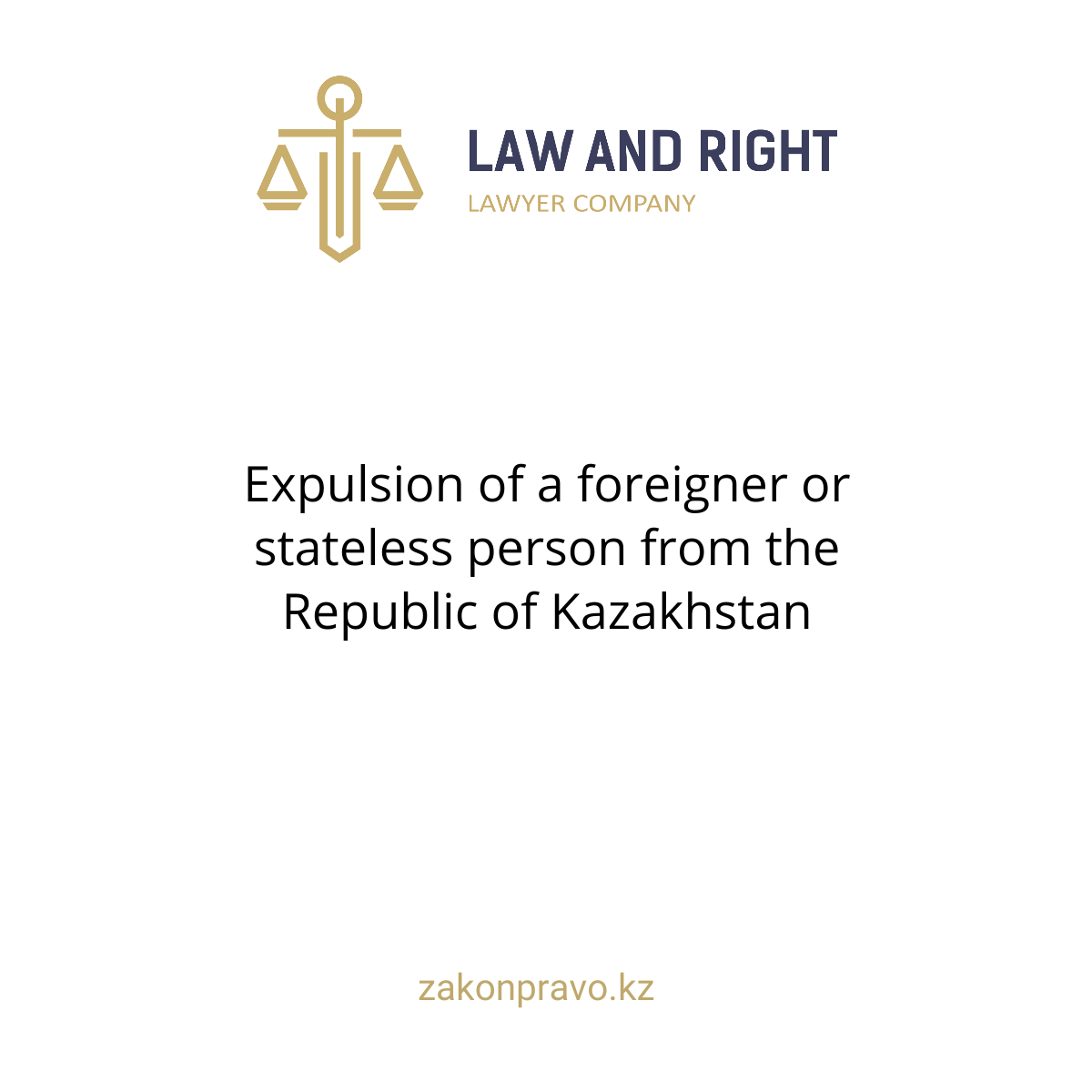Expulsion of a foreigner or stateless person from the Republic of Kazakhstan
🟩 Article 51 of the Criminal Code of the Republic of Kazakhstan
Expulsion of a Foreigner or Stateless Person from the Territory of the Republic of Kazakhstan
🔹 1. Legal Nature of the Punishment
Expulsion is a form of criminal punishment involving the forced removal of a person who is not a citizen of the Republic of Kazakhstan from its territory. It carries both punitive and preventive purposes: it is applied as a sanction for criminal offenses and serves to prevent their recurrence.
This measure is based on the sovereign right of the state to regulate the stay of foreign citizens and stateless persons on its territory (see Article 51 of the Constitution of the Republic of Kazakhstan, and the Law "On the Legal Status of Foreigners").
🔹 2. Types of Punishment
Expulsion may be:
- A principal punishment — applicable only for criminal infractions;
- An additional punishment — applicable for crimes and criminal infractions.
As an additional punishment, expulsion is imposed alongside the principal punishment (e.g., a fine or imprisonment) and is executed after the principal punishment has been served or the person has been conditionally released.
🔹 3. Conditions and Procedure for Execution
- Entry ban term: 5 years from the date the expulsion is actually carried out (Part 1 of Article 51 of the Criminal Code of the Republic of Kazakhstan).
- Execution is compulsory: the person is physically escorted to the border of the Republic of Kazakhstan by competent authorities (usually the migration police).
- If the sentence is conditional, expulsion is carried out immediately after the sentence enters into legal force, even if no other form of punishment is served.
- If the convicted person is released from punishment on the grounds specified in subparagraphs 3, 5, 6, and 7 of Part 1 of Article 161 of the Penal Enforcement Code (e.g., due to illness, amnesty, or statute of limitations), expulsion must still be carried out.
🔹 4. Constitutional and International Guarantees
Expulsion must not violate Kazakhstan’s international obligations. In particular:
- Article 12 of the International Covenant on Civil and Political Rights (ICCPR) prohibits arbitrary expulsion.
- Article 33 of the 1951 Geneva Convention relating to the Status of Refugees prohibits expulsion of refugees except in cases of national security threats.
- According to Article 9 of the Constitution of the Republic of Kazakhstan, foreigners and stateless persons on the territory of Kazakhstan enjoy rights and freedoms on an equal basis with citizens, subject to limitations established by law.
Expulsion is not allowed in the following cases:
- Where the person faces torture or cruel, inhuman, or degrading treatment in the country of return;
- Where the person is the sole provider for minor children who are citizens of Kazakhstan;
- Where the person is a refugee or has applied for asylum.
🔹 5. Examples from Judicial Practice
📌 Example 1: A foreign citizen convicted of a criminal infraction (illegal entrepreneurship) was fined and additionally expelled from Kazakhstan with a five-year entry ban. The court considered that he had no family ties in Kazakhstan and was not socially vulnerable.
📌 Example 2: A stateless person convicted of theft (Part 1, Article 188 of the Criminal Code) was expelled after serving his sentence in a general regime colony. The appellate complaint was dismissed as unfounded since the court found no legal basis for the person’s residence in Kazakhstan.
🔹 6. Related Articles and Laws
- Penal Enforcement Code of the Republic of Kazakhstan:
- Article 161 – Grounds for termination of punishment;
- Articles 177–179 – Procedure for enforcing expulsion sentences;
- Law of the Republic of Kazakhstan “On the Legal Status of Foreigners” – Article 20 (expulsion);
- Constitution of the Republic of Kazakhstan – Articles 12, 51;
- International Treaties:
- ICCPR (UN, 1966);
- Refugee Convention (Geneva, 1951);
- Convention Against Torture (UN, 1984).
🔹 7. Problematic Issues and Legal Positions
📌 Question: Can a person be expelled if they live with a Kazakh citizen and have minor children?
🔸 Answer: According to judicial practice and the principle of humanity, courts may refuse to impose expulsion if it results in disproportionate interference with private and family life (see European Court of Human Rights case law under Article 8 of the European Convention on Human Rights).
📌 Question: Can expulsion be appealed?
🔸 Yes. According to the Criminal Procedure Code of the Republic of Kazakhstan, any sentence, including in the part of additional punishment, can be appealed in both appellate and cassation instances.
🔹 8. Conclusion
Expulsion is an effective but strict measure of criminal law enforcement, applied exclusively to foreigners and stateless persons. It must comply with:
- The principle of legality;
- The principle of proportionality;
- International humanitarian and human rights standards.
Let me know if you'd like this formatted for court use, publication, or bilingual documentation.
Attention!
Law and Law Law Law draws your attention to the fact that this document is basic and does not always meet the requirements of a particular situation. Our lawyers are ready to assist you in legal advice, drawing up any legal document suitable for your situation.
For more information, please contact a Lawyer / Attorney by phone: +7 (708) 971-78-58; +7 (700) 978 5755, +7 (700) 978 5085.
Attorney at Law Almaty Lawyer Legal Services Legal Advice Civil Criminal Administrative Cases Disputes Protection Arbitration Law Firm Kazakhstan Law Office Court Cases


